The alarming trend in which families resort to kerosene and a match-stick instead of counselling, to manage conjugal discord, is worrisome. A society that has come out of sati, barely a century ago, and is busy fighting female foeticide, can afford high divorce rate than bride burning. Introspecting the new societal deformity, Syed Asma reports the weird nature of relationships that is gradually becoming the new normal in the family norms, in one case a woman marrying the same man who killed her sister
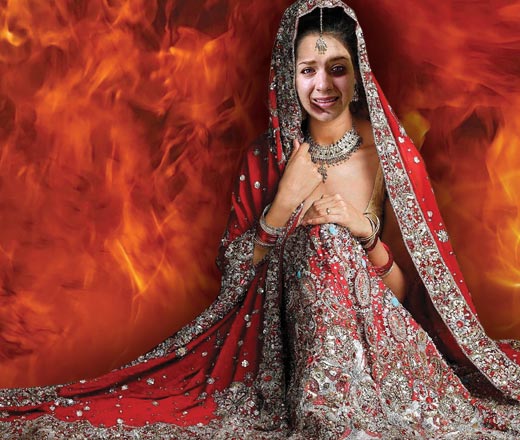
It was Eid-ul-Azha, one of the two major Muslim festivals, when a neighbour saw Mehjabeen engulfed in flames inside the kitchen. She was at her in-law’s house. The neighbour quickly informed her parents in Ishbar, Nishat on the outskirts of Srinagar.
As the word spread in the neighbourhood, Mehjabeen was taken to the hospital. Hours later Mehjabeen died of her injuries leaving behind two daughters, the younger is six-year-old.
Miles away Sakeena was listening to the news of Mehjabeen’s tragic death with shock! Though Sakeena had never met Mehjabeen, the threads of their life stories have many commonalities.
“I cannot discuss it with anyone, but my wounds are as fresh as Mehjabeen’s family,” says Sakeena.
Some 30 years ago, on a chilly Chilai Kalan afternoon (coldest 40 days of winters), a kid came running to Sakeena’s house and shouted: “Rosy didi is killed…she is burnt.”
Gaining his breath he added, “Aba (father) sent me to inform you all.” The kid’s father was Sakeena’s neighbour who ran a grocery shop near Rosy’s in-law’s house. “Rosy was my elder sister,” says Sakeena, forcing her tears back.
There was nobody at the house except Sakeena and her mother when that kid came with news of Rosy’s death. “Both my brothers were out for work.”
Sakeena remembers how Rosy used to share her ordeal at her in-laws with her mother.
But her mother used to say the same thing every time: wairuv gai qabar, czot ya zeet, su chu nibavun aasaan (Your husband’s house is your destiny now. You must learn to manage).
On several occasions, Sakeena had suggested Rosy react to her in-law’s ill behaviour, but she never agreed. “Until they burned her off,” says Sakeena with tears rolling down her cheeks.
It happened some three decades back, when telephones were a luxury, so it is hard to say what exactly happened that day.
A month before her death Rosy has stayed with her family [parents’ home] for a few weeks. “She was here for some days after our father died of illness,” says Sakeena.
It was during that stay Rosy poured her heart out in front of her younger sister Sakeena. “I am sure her mother-in-law killed her,” says Sakeena.
All the problems in Rosy’s life were because of her mother-in-law, claims Sakeena. She used to torture Rosy for little dowry and giving birth to two daughters.
Though Rosy claimed her husband cared a lot for her but Sakeena says he was a complete ‘mummy’s boy’.
“I agree that a son has to remain obedient to his mother after getting married but not at the cost of his wife and children. It is essential to maintain a balance,” asserts Sakeena.
After receiving the news of Rosy’s death, Sakeena could not react for a long time. “I was in shock. I was completely numb. My mother fell on the ground unconscious.”
After helping her mother gain consciousness, Sakeena ran towards a public telephone booth and left a message for her brother at his office. “Then along with a few neighbours, I rushed towards Rosy’s house.”
Rosy’s body was wrapped in a blanket and placed on the veranda of her in-law’s house. Her mother-in-law, her husband, and her sister-in-law were sitting at a distance. There was pin-drop silence that Rosy’s mother finally broke.
“I could not cry for a long time. I could believe that she is dead. How can they burn her?” says Sakeena, who is eight years younger than Rosy. “She (Rosy) treated me like her daughter.”
After her marriage Rosy used to share her ordeal at her in-laws with Sakeena. “I am sure that she was killed by her mother-in-law,” Sakeena repeatedly asserts.
Sakeena was numb for a few days after she saw her sister’s charred body. “By the time we reached there, Rosy was already dead. Believe me, I could not recognize her. The blanket had stuck to her body.”
By the time Sakeena gained senses, Rosy was already buried. The first thing she asked was about Rosy’s two daughters –eight and five-year-olds.
Rosy was born into a financially modest family. Her father was labour and served a family of six. Having financial constraints, the father could not send any of his children to school and thus had to marry them off in families having similar backgrounds, both financial and educational.
Similarly Rosy’s husband Ayub, a watchman by profession, who was a lone earning hand in a family of eight members.
Ayub’s mother wanted to marry her son in a well-off family so that their financial woes could end. “She wanted to raise their living standard by the dowry Ayub’s wife would bring,” says Sakeena. “But our father couldn’t manage much for Rosy’s dowry. And it became the sole reason for her painful existence at her in-laws.”
Dowry is the basic reason for all the chaos in a married woman’s life, feels Nayeema Ahmed Mehjoor, chairperson of State Commission for Women. “A boy’s parents think marriage is the easiest way to change their financial status overnight.”
Mehjoor feels that the greed of becoming rich has increased many folds over the years in an otherwise culturally strong society like Kashmir. Rosy became the victim of that greed.
A few days after Rosy’s death, Sakeena and her brother went to seek her daughters’ custody from their father. “I don’t understand how he got the courage to keep his daughters. He did not allow us to take them along,” says Sakeena.
But unlike her sister Sakeena was a brave girl. “I went to him and slapped him thrice and told him, if you could not take care of your wife, you cannot take care of your daughters, so I am taking them along.”
But Ayub was adamant. He didn’t let Sakeena take his daughters. For the next ten years, Ayub did not let Sakeena’s family meet the daughters.
In these ten years, life took a dramatic turn for both Ayub and Sakeena. While one of the Ayub’s sisters died of cancer, his mother passed away after suffering a stroke. “She was left paralysed for a long time before her death,” says a visibly happy Sakeena. “Honestly, I felt very happy when I heard what happened to them. I hated that family a lot.”
What happened next shocked everyone including Sakeena’s family members! In the meanwhile, Sakeena’s family started looking for a match for her but could not finalize anybody for one reason or another. She was already 32. “It took us a few years to start the search because of Rosy’s death,” says Sakeena. “It is really difficult for a girl to face the world if she is in her thirties and still unmarried.”
In that chaos, one day a distant relative of Sakeena proposed Ayub’s name to her mother for marriage! Marrying the person who was responsible for her sister’s death was unthinkable for Sakeena. “But then life is full of unthinkable twists and turns,” feels Sakeena. “I said yes for two reasons: first to be with Rosy’s daughters and second to get rid of my unmarried tag.”
One of the reasons Sakeena agreed to get married in the same family was Ayub’s mother’s death. “Many thought Ayub and I had an affair so we killed Rosy,” says sobbing Sakeena.
However, such stories hardly bother Sakeena. “My wounds are still fresh but I can’t share my pain with anyone, neither my husband nor my kids.”
Initially, Sakeena’s brothers were completely opposed to the idea of marrying their second sister to Ayub. “But after my intervention, they too agreed.”
Presently Sakeena and Ayub are busy making preparations for the marriage of Rosy’s elder daughter. “The groom is well settled in Dubai,” says Sakeena with a smile.
There are many more painful stories of atrocities against women that go unheard and unreported in Kashmir.
Each year almost 830 people are booked under domestic violence cases. In last five years 4157 people have been booked for domestic violence in J&K.
After living in an active conflict zone for around three decades people have become highly impatient and intolerable feels Nayeema Ahmed Mehjoor.
Amina’s case is another example of growing intolerance in society. Despite her modest upbringing Amina was a pampered child. She was the lone sister among two brothers.
“We raised her with a lot of love and care but could not save her from getting murdered by her husband,” says one of Amina’s brothers. Amina was married to a truck driver in Kupwara. She had a three-year-old son.
Amina’s mother blames that since Amina did not bring “satisfactory” dowry, her mother-in-law forced her to live in rented accommodation. “She had a good relationship with her husband. I don’t understand what made him kill his wife,” asks Amina’s mother.
However, Amina’s brother claims that a few months before her death, her husband’s behaviour has changed completely towards his sister. “He used to beat her quite often.”
Amina’s brother is apprehensive that his sister was either killed for bringing “unsatisfactory dowry” or her husband had an extramarital affair. She was killed by her husband after a heated argument between them, claims her brother.
Without any information about what transpired on that day Amina’s family is apprehensive that her mother-in-law might have instigated the argument between the couple.
Amina’s family has lodged an FIR against her husband and his mother in the concerned police station. “We are hopeful that police will take the culprits to task,” says Amina’s brother.
Amina’s family is now fighting for the custody of her three-year-old son. The family is afraid that what will happen to the kid after Amina’s husband will remarry? A stepmother cannot take care of the kid like a mother, they apprehend.
Aarti’s is a similar case but more painful. She was a resident of a remote village in the Jammu district and had two minor daughters. They paid the price as their mother was unable to bring sufficient dowry. Aarti’s husband Vinod, an autorickshaw driver by profession, was a drunkard. Out of his meagre income, Vinod was supporting a family of six members including his wife and two daughters. Aarti’s family believes that it was poverty-driven frustration that led to regular fights between the couple. “The major share of Vinod’s income was consumed by his drinking habit. Rest he would spend on his mother, leaving his wife to fetch for their daughters,” alleged Aarti’s brother.
It made things worse for Aarti. “She would often complain about her husband’s indifference towards their daughters,” says Aarti’s brother, “My sister used to work as household help in the neighbourhood to meet the ends.”
One night the argument between Aarti and Vinod took an ugly turn. In a fit of anger Vinod set fire to his wife and two daughters, alleged Aarti’s brother. “Vinod was unhappy that Aarti has given birth to two daughters. He would also ask for dowry from my sister.”
The police had arrested Vinod and his brother for murdering Aarti and her two daughters.
“This is brutal!” says Mehjoor who has sent a proposal to the government that a shelter home should be built for victims of domestic violence. perhaps, victims do not usually react to the atrocities of their in-laws because they have nowhere to go.
Mehjoor believes that even the parents and siblings of the victims at times act hostile towards them. They (relatives) are reluctant to accept them back into the family. “A shelter home will encourage victims to fight back.”
(Some of the names in the story have been changed to protect the identity of the victims)


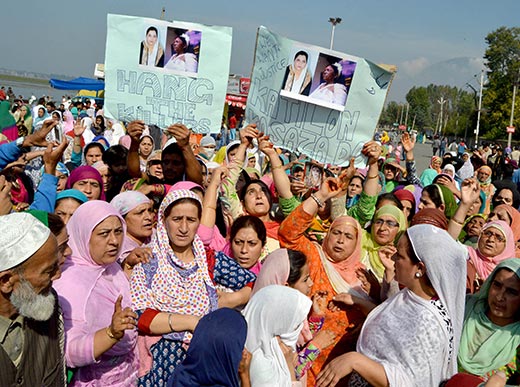
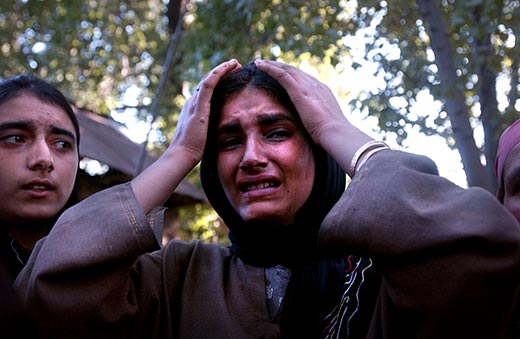
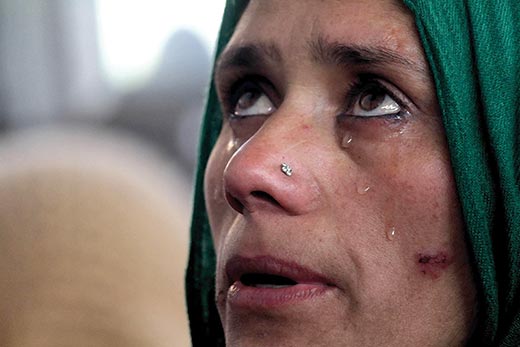
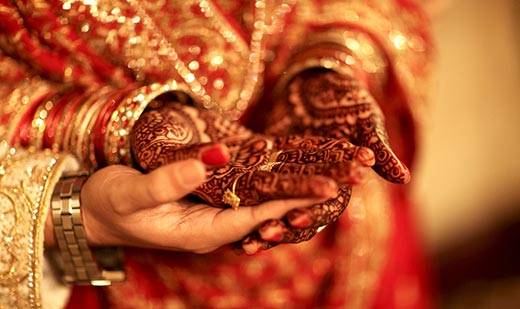














Very good story by Syed Asma, to focus on one of the grave social deformities we as Kashmiri muslims have developed. I suggest bold, frank, transparent and clear talks on all related issues and negotiations before solemnizing our marriages—whether by choice or arrangement. I don’t think boys’ families marry off their children to make fortunes. There could be exceptions. It is our mindset and priorities mostly set by womenfolk (like our mothers, sisters, grandmothers particularly in the guise of cultural traditions, so called family REET -RIVAJ etc etc) that create issues of dowry, daughter in law versus mother in law frictions, broken families, divorces, etc, etc. The issue in discussion has many facets. I see intrigues, malaise and hypocrisy rule the roost, from both the sides. I personally denounce all kinds of violent actions like burning women on mere pretext of material things. There are many many cases wherein women resort to excesses against their HUSBANDS. Finally, we all——-men, women, family elders need to discuss dispassionately the root causes that includes changing patterns of our priorities in the larger context, family discords, expectations and respect of elders, etc etc. We all know how our mothers, sisters etc compel MENFOLK to adhere to the KHARAFATI traditions and always men have to eat humble pie. The story writer should have ideally talked to MARRIED MEN as stakeholders. Also other stakeholders including sociologists having atleast real pulse and understanding of the issues. It could be next time. Saima Bhat has also written good pieces on the related issues. Good luck to KASHMIR LIFE, really concerned about the SURVIVAL of RACE Kashmiri……………….. Regards TARIQ